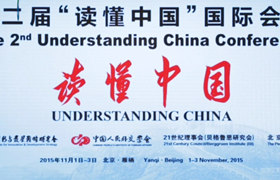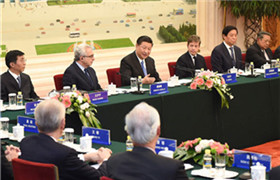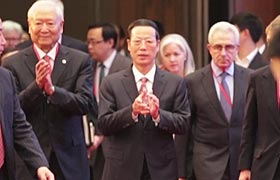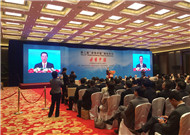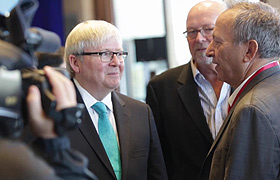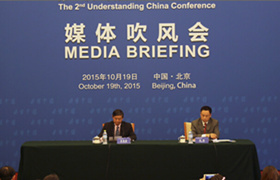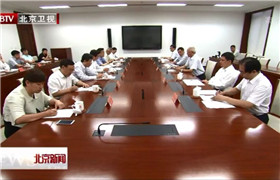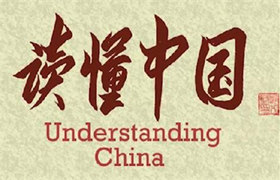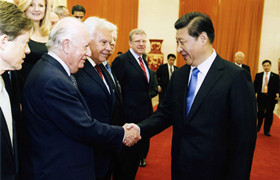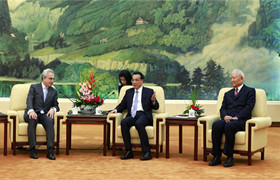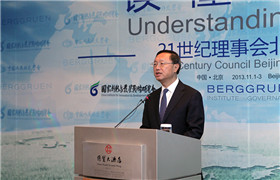- HOME--> Chairman
-
“Chinese Dream” Bound to become a Strong Note of the Times
Source:国家创新与发展战略研究会
Zheng Bijian
The general secretary of the CPC Central Committee Xi Jinping, when visiting the grand exhibition of “The Road to Revival” made an important speech that reviewed the past, the present and envisioned the future, demonstrating our determination and confidence in further building the Party, the country and the nation and in forging ahead toward the goal of the great rejuvenation of the Chinese nation.
Zheng Bijian, former executive vice president of the Party School of the Central Committee of CPC and Chairman of China Institute for Innovation and Development Strategy (CIIDS), after a careful study of Xi’s speech, said in an interview with Jiefang Daily’s reporter yesterday that Xi’s speech is simple but profound. Xi incisively elaborated on the future of China and its people, placing earnest expectations on and encouragement for the entire Party and all the Chinese people. His speech would undoubtedly enhance the national consensus on development.
“It is impossible for China to have anything like the American Dream, the European Dream or the Soviet Dream. China can only have the China Dream, which means China must unswervingly pursue the road of socialism with Chinese characteristics and achieve national development and socialist modernization through peaceful and civilized means.” Zheng emphasized that realizing the “Chinese Dream” of the great rejuvenation of the Chinese nation is bound to be a strong note of the times.
The Chinese Dream is not the “American Dream” or “European Dream”
Reporter: General Secretary Xi Jinping, in his speech, by reviewing the past, present and envisioning the future, expounded on the “Chinese Dream” of the great rejuvenation of the Chinese nation. So, how do we accurately understand the “Chinese Dream”?
Zheng Bijian: When the CPC was founded in 1921, the country was split, backward and impoverished, its people bullied and humiliated by the imperial powers. Ninety years later, China is a united country, an equal member of the international community and its people full of hope to achieve the great rejuvenation of the nation.
How did this major historical change come about? The decisive factor is that China has a champion and path-finder that its people can rely on to constantly adapt the Marxist theories, lines, principles and policies to the changes in the international and domestic situations, the Party and the great practice of the people. This champion and path-finder is the Communist Party of China, the essential force that will lead the people to achieve the “Chinese Dream”.
At the new development stage in the new century, rejuvenation can only be achieved by clearly understanding our distinctive national conditions. The “Chinese Dream” is to solve China’s problems. For instance, we cannot afford the “American Dream” of consuming 25 barrels of oil per person every year. Nor can we dream of achieving development through establishing colonies all over the world as the Europeans did in earlier centuries. China can only make earnest effort and rely on itself to address the enormous problem of migration on its own land. Moreover, to improve comprehensive national strength, China will by no means harbor the “Soviet Dream” of engaging in arms race or “exporting revolutions”. Nor shall we deploy military bases all over the world as the world’s only super power—the United States has done. The Chinese dream, in essence, stands for safeguarding national sovereignty and territorial integrity, and achieving national development and socialist modernization through peaceful and civilized means.
It must be stressed that the key to realizing the “Chinese Dream” is our own development. In the second decade of the 21st century, at the critical stage of completing the building of a moderately prosperous society in an all round manner, as the world’s largest developing country operating in a increasingly competitive international environment, “liberating the mind” must still be centered on further releasing and developing the productive forces. Building on the experience of reform and opening up over the past thirty plus years, we must raise the productive forces of the Chinese people to a new high level both qualitatively and quantitatively (qualitatively in particular). Only in this way can we, in the second decade and till the middle of the 21st century, genuinely achieve better and more extensive social and economic progress, constantly improve people’s standard of living and the quality of life and effectively respond to various challenges, both predicable and unpredictable.
The Chinese Dream further consolidates the consensus on “the path” we should pursue
Reporter: The long road to revival embodies the aspirations of generations of Chinese. General Secretary Xi Jinping’s speech has further enhanced the consensus of all people that socialism with Chinese characteristics is the only path to the realization of the “Chinese Dream”. What is the thinking of the CPC members on their historical mission that is reflected in this consensus?
Zheng Bijian: Anyone who is unbiased and respectable of history and facts can see that it is with socialism with Chinese characteristics as guidance that we have turned China into a highly dynamic, rapidly growing and increasingly prosperous country. Vastly different from “doctrines” practiced in some other parts of the world that either result in disturbing political changes or have come to a dead-end, this theory is hugely superior and dynamic. History has proven that the road of socialism with Chinese characteristics is the only path leading towards the great rejuvenation of the Chinese nation.
The road of socialism with Chinese characteristics has not only inherited Marxism but also contained some new awakening: First, what is Marxism and how to approach Marxism? Integration of Marxism with Chinese realities means staying true to Marxism while avoiding the dogmatization of Marxism. Second, what is socialism and how do we build socialism? It is essential to proceed from the national conditions and develop socialism with Chinese characteristics, first and foremost socialism with Chinese characteristics at the primary stage. Third, what is the Chinese Communist Party truly about and how do we develop the Party? It is important to emphasize the important thought of the Three Represents, the CPC as the vanguard of the Chinese working class and all the Chinese people, and the idea that the Party is built for the public and it exercises state power for the people. Fourth, what is the development we would like to see and how do we achieve it? The answer is to embrace the Scientific Outlook on Development, and reject the predatory, unsustainable development model that disregards the holistic development of man and sacrifices the interest of future generations.
In the second decade of the 21st century, the CPC will continuously push forward magnificent historic changes and achieve new awakening about itself. It is critical to combine liberating the mind with liberating the productive forces, the great undertaking led by the Party with the Party’s conscientious effort of self-development, and the Party’s internal solidarity with the unity between the Party and the people. Obviously, it doesn’t make any sense nor does it have any future if we stray away from the realities of China and the road and theoretical systems that have proven to be very successful but pursue any other doctrines or development models.
The realization of the Chinese Dream requires the integration of knowledge and action
Reporter: General Secretary Xi Jinping stressed on the importance of action in realizing the “Chinese Dream”. What are the obstacles hindering the realization of the “Chinese Dream” and how do we overcome them?
Zheng Bijian: “Empty talks would lead a country astray, and hard work can rejuvenate a nation”. This is an important lesson of state governance drawn from our experience over thousands of years. Amid the debate over capitalism vs. socialism in China in the early 1990s, Comrade Deng Xiaoping decisively put an end to such a discussion, simply because he was worried about empty talks and debates costing China the strategic opportunities for development.
To realize the Chinese Dream, we must unify “knowledge” with “action”, pool our efforts to overcome tough challenges. That’s to say, all Party members, the cadres first and foremost, must unify their mind and actions in today’s reality of socialist market economy, diversified interests and ideas, and greater participation in economic globalization. On that basis, we must unite all the forces possible in and outside the Party, and mobilize all the positive factors possible in and outside China. This is no less than a severe historical test.
To overcome tough challenges requires all Party members, the cadres first and foremost, be fully prepared to actively tackle the complicated problems in many different areas in the second decade of the 21st century. It is important that we should proceed from the national conditions at the primary stage of socialism and take on the many challenges cool-headedly. These challenges include: constraints from limited energy and other resources, ecological environment, unbalanced economic and social development, catastrophic natural disasters and pressure from international economic, political, technological, cultural and military developments and crises on a worldwide scale.
Confronted with the grave challenges, we have worked hard trying to achieve “transcendence in three aspects” --- transcending the old way of industrialization by western powers which set up colonies and plundered resources all over the world; transcend the old way of development sought by Germany and Japan through wars in an attempt to re-distribute colonies in the world; transcend the old mentality of seeking hegemony and sphere of influence by superpowers. We are soberly aware that even when we have completed the building of a moderately prosperous society comprehensively that benefits more than one billion people by 2020, we will still be at the primary stage of socialism and will remain to be so for a long period to come. Hence, we should pay close attention to the complicated and dual nature of the various tasks in front of us. As the Report to the 18th CPC National Congress exhorts us: we should neither look down upon ourselves nor be arrogant, and never vacillate in or relax our efforts or act recklessly, and forge ahead with tenacity and resolve; in this way, we will surely complete the building of a moderately prosperous society in all respects when the Communist Party of China celebrates its centenary and turn China into a modern socialist country that is prosperous, strong, democratic, culturally advanced and harmonious when the People's Republic of China marks its centennial. We are confident that the “Chinese Dream” as such is bound to be a strong note of the times.
(This article appeared in the December 3, 2012 issue of Jiefang Daily.)
-
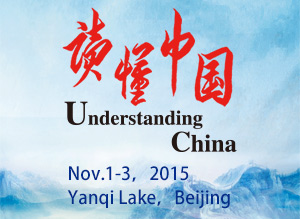
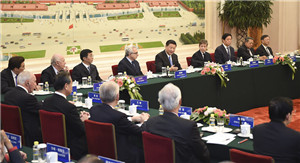
The 2nd "Understanding China" ConferenceOn November 1~3, 2015, the 2nd “Understanding China” Conference was held in Beijing Yanqi Lake International Conference Center. Zhang Gaoli, Vice Premier of the State Council, attended the opening ceremony.
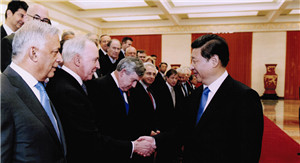
The 1st "Understanding China" ConferenceOn November 1~3, 2013, the 1st “Understanding China” Conference was held in Beijing, which was cosponsored by China Institute for Innovation & Development Strategy (CIIDS), Chinese People’s Institute of Foreign Affairs (CPIFA), and Berggruen Institute on Governance.
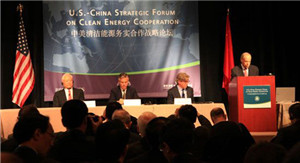
The 2nd U.S.-China Strategic Forum on Clean Energy CooperationWith the “Prospects for U.S.-China strategic cooperation in next decade” as its theme, the forum dwells on the implications of U.S.-China cooperation from the strategic perspective of coping with global challenges and maintaining world peace.
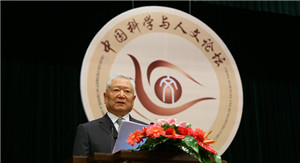
The China Sciences and Humanities ForumCo-initiated in April 2003 by renowned Chinese scientist Mr. Lu Yongxiang and influential political strategist Zhen Bijian, China Sciences and Humanities Forum was jointly hosted by Graduate University of Chinese Academy of Sciences (GUCAS) and the Higher Education Press.

